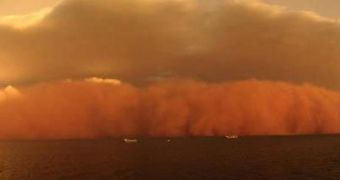The news broke that, following a devastating heat wave that caused various regions of the country to become engulfed with flames, Australia got hit by a red dust storm.
The storm made landfall this past Wednesday evening, and people living on the country's west coast were both shaken up and taken aback by this natural phenomenon.
Specialists explain that red sand storms are the result of sand and dust being carried away by wind and rain following their having been taken from land.
Eyewitnesses say that it only took a few minutes for the storm to form and reach its full potential, the Atlantic Wire reports.
Measurements carried out by meteorologists indicate that, at the time of its making landfall, the storm was driven by winds whose speed revolved around 63 miles per hour (about 102 kilometers per hour).
As frightening as pictures and footage of this red dust storm might be, specialists warn that what Australians should be concerned about is the cyclone that is expected to soon follow.
Thus, the same source informs us that this coming Sunday – give or take a few hours – this country will be hit by a category-three cyclone, whose wind gusts will pack significantly more force, seeing how their average speed will be one of roughly 80 miles per hour (approximately 129 kilometers per hour).
Therefore, despite the fact that the red dust storm did not cause any noteworthy structural damages, this year's first cyclone stands to more than make up for the storm's “failure.”
Local authorities are busy getting ready for the arrival of the cyclone, and plans have been made to shut down oil and mining activities in various coastal areas.
Specialists wished to emphasize that Wednesday's storm and the upcoming cyclone were in no way linked to one another.
Still, they confessed to having doubts about whether or not both these natural phenomena might have been caused by the massive heat wave that recently hit Australia.

 14 DAY TRIAL //
14 DAY TRIAL //